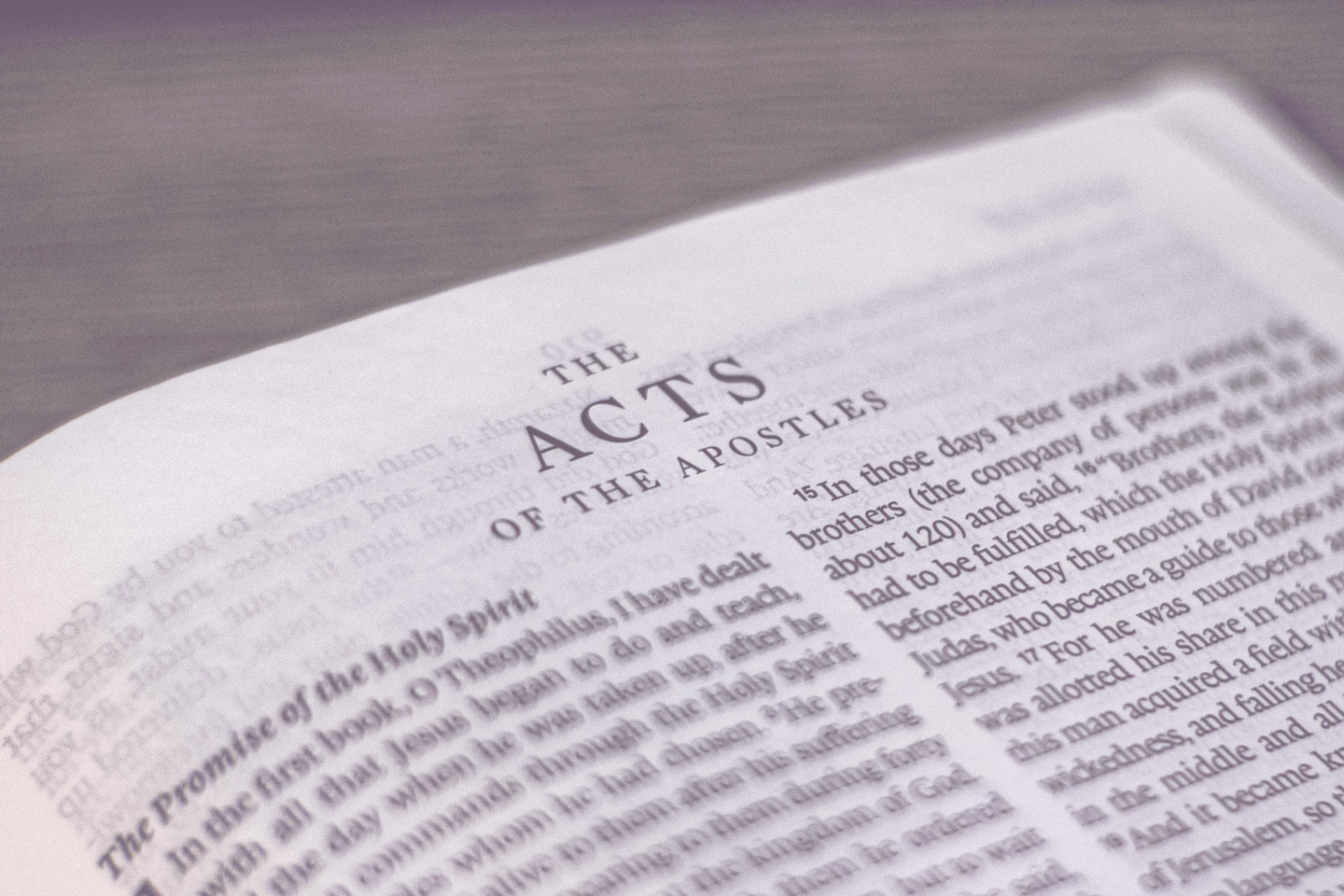Acts of Evidence
Is the Book of Acts a reliable historical document or just a biased account? This article explores if Acts is reliable and accurate. Examine the evidence and draw your own conclusions.

The Facts of Acts
If you’re like I was before God drew me to Jesus Christ, you may have wondered about the reliability of Jesus’ story. While in my journey of doubt, I found much of my disbelief stemmed from myths and falsehoods. After I read the New Testament and researched the historical aspects, I became convinced the record of Jesus is true. Through my journey from doubt to belief, I discovered compelling facts and evidence that support the reliability of the New Testament, particularly the Book of Acts
I argue that if the Book of Acts is both a reliable and historically accurate document, then it therefore provides strong evidence for the reliability of the Gospel of Luke, as the majority of scholars hold that these two texts were intended to be read as a two-volume work. The shared authorship, continuity of narrative, stylistic and linguistic similarities, and theological coherence between these texts suggest that if Acts is trustworthy, then the Gospel of Luke is also highly probable to be a reliable historical account.




Luke the Physician
What do you get when you cross an evangelist and a writer with a Greek physician? You get Luke’s Gospel and the Book of Acts. The perfect prescription for salvation! As Jesus said in Luke 5:31, “It is not those who are healthy who need a doctor, but those who are sick.” Jesus is the only remedy.
But, regardless if you’re a believer, an agnostic skeptic, or just a person interested in history, both of Luke’s writings offer valuable details and a reliable account of the events that surround the birth of Christianity and the people who helped shape it. This includes Jesus’ life and Christianity’s spread throughout the Roman Empire.
Luke has a reputation as a careful and accurate historian. And his use of eyewitness testimony contributes to his reputation. This makes his writings a goldmine of a resource for those who are studying the Roman Empire during the first-century.
Luke’s Medical Precision
An example of Luke’s accuracy can be found in Acts 27, where he shares the Apostle Paul’s journey to Rome. In verse 16, Luke mentions a small island called Cauda, where the ship took shelter from a severe storm. This detail might seem insignificant, but it demonstrates Luke’s precise knowledge of Mediterranean geography.
Where as, two renowned ancient geographers, Pliny the Elder (23-79 CE) and Ptolemy (100-170 CE), both misidentified the location of Cauda. Pliny placed it off the western coast of Crete, while Ptolemy positioned it off the eastern coast. Despite their errors, these scholars are often held in a much higher regard by modern academics. In contrast, Luke’s placement, which has been confirmed by modern archaeological evidence and even satellite imagery, is dismissed and treated with skepticism simply because His writings include Jesus Christ as Lord and Savior.
This double standard reveals an unjustified and clear bias against biblical authors. We readily accept the writings of Pliny and Ptolemy, as well as other secular works from the same era, as reliable sources — despite their inaccuracies. Luke’s correct identification of Cauda’s location lends credence to his reputation as not only reliable, but meticulous, and shows that the details in Luke-Acts are trustworthy.
This exposes the need for a fair and unbiased assessment of biblical texts. We must be willing to evaluate Luke’s writings on their own merits, without closeminded prejudice based on his religious beliefs.




A Reflection of Profession or Faith
A common claim against Luke’s writing is that Luke’s Christian bias influenced or distorted his writings. The reality of this is the opposite. Luke was well-educated and most likely a physician by profession.
Luke’s Christianity provably lends credibility and reliability to his writings. Look at the letter from Pliny the Younger, a Roman governor 112 CE with no interest in promoting Christianity. His letter to Emperor Trajan witnessed that Christians made a solemn vow to uphold strict moral standards, including honesty, integrity, and sexual purity — And Pliny got this information through interrogation and order of execution! Under not the threat of death, but the knowledge they would be killed, they upheld these ethical and moral standards.
Early Christians took their moral and ethical commitments seriously! They were known for their honesty and integrity. As a Christian himself, Luke would have shared these values and would have accurately and truthfully recorded his findings without distortion. Therefore, Luke’s Christian bias actually makes his work more reliable and trustworthy.
Pieces of the Same Historical Puzzle
A claim I hear often is that Luke’s original work can be trusted, but over time his work may have been altered and is no longer accurate in the details about Jesus and his life. But, this claim is speculative and inaccurate. Acts of the Apostles is one of the most scrutinized ancient texts by both Christian and secular scholars. The thing is, if there were any true inaccuracies or alterations, these scholars would have already discovered them.
However, the piece of evidence used in this claim against Luke’s writings is Acts 8:36-38. Research conducted since the 1611 KJV has uncovered earlier manuscripts than what was available to the KJV translators. While I’ll discuss proximity later, these earlier and better manuscripts don’t contain Acts 8:37. It is believed v37 was a later addition, potentially added by a scribe’s margin note.


With the exception of a few, modern translations such as the CSB do not include v37 and provide a footnote. They are fully transparent and do not intend to hide that it was previously included but has since been axed.
Though verse 37 is not included in the oldest manuscripts, it doesn’t express anything new or conflicting in comparison to the rest of the Bible and is very similar to Romans 10:9. Though debated, there is a high probability that Luke didn’t write it and is not an evidence against Luke or Acts, but evidence that Christians strive to uphold the accuracy of scripture and are willing to adjust as new evidence is presented.


Comparing the Puzzle Pieces
A piece of strong evidence for the historical reliability of the Book of Acts is that it includes events and locations that are confirmed by later historians. Tacitus, Suetonius, and Cassius Dio are historians whose writings offer us a glimpse into the lives of people living under Roman influence. By studying their writings, we gain a better understanding of the different reigns of the Emperors throughout Roman history. The intersecting details are all consistent with the descriptions provided in Acts.
These later historians are often cited as the primary sources for our knowledge of the various topics they cover in their time period. The Book of Acts includes information that is consistent with these accounts, indicating that Acts is based on accurate historical information. And because the Book of Acts was written earlier, it is based on primary or near-primary knowledge.
Proximity and Prejudice
When evaluating historical documents, scholars often apply a set of rigorous criteria to ensure that the information they contain is accurate and reliable. One of these criteria is called ‘proximity’. It means the closer the document was created to when the event happened, the more trustworthy it is likely to be.
This standard has often been used to discredit the Book of Acts as a historical document. Because the Book of Acts was written between 70-90 CE and covers the timeframe between 30-62 CE — Given that it was written decades after the events it describes, the conclusion is that it is not a reliable historical document. Let’s explore that.


Tacitus
- Tacitus covered 14–68 CE
- He wrote on the reigns of Tiberius, Caligula, Claudius, and Nero.
- He was 12-years-old when Nero died and wasn’t alive for prior reigns.
- In ~98 CE, Tacitus began these writings
Suetonius
- Suetonius covered 49 BCE—96 CE
- He wrote on the reigns from Julius Caesar to Domitian.
- Suetonius wasn’t born until 69 CE, after Nero died.
- In ~121 CE, Suetonius wrote Lives of the Twelve Caesars
Cassius Dio
- Cassius covered ~1,000 years from 753 BCE—229 CE.
- Cassius Dio was born in 155 CE
- In ~220 CE, Cassius Dio wrote Roman History
Luke the Physician
- Luke covered ~30-62 CE
- He wrote about Jesus and the early Christian Church
- Luke was born in ~5-30 CE
- In ~65-90 CE, Luke wrote Acts of the Apostles
Using this standard to discredit the Book of Acts as a historical document because it was written decades after the events it describes, While, these historians did not write their accounts until further time had passed — even centuries after the events they describe! That’s not a standard. That’s a double standard.
Secondary Sources and Historical Courses
To circle back, the writings of Tacitus, Suetonius, and Cassius Dio, are the primary sources for our knowledge of the character and reigns of the Roman emperors Tiberius, Caligula, Claudius, and Nero. Which means that the primary source for our knowledge is secondary sources.
Here’s the thing, Tacitus was 12 years old when Nero died. He was too young to personally witness Nero’s reign. Yet, he wrote in ~100-116 CE. If we apply what is often applied to Luke’s work then Tacitus’s works would be less reliable according to the standard of proximity to the events themselves.
Suetonius and Cassius Dio weren’t even born until after the death of Nero. Suetonius didn’t write until 121 CE and Cassius Dio didn’t write until ~220 CE. Do you see the double standard?


Acts is both a primary and near-primary source, as well as a secondary source of eyewitness testimony. Tacitus, Suetonius, and Cassius Dio are secondary sources. Yet, their writings are our primary source and the majority of what we accept as fact about the character, policies, and events that occurred during these Emperor’s reigns comes from these secondary sources. But the Book of Acts is deemed written too late after the events occurred to be considered reliable — even though Acts is an earlier source and at minimum a near-primary source.


Luke’s Lamp
As I’m sure you can see and understand, Luke’s Book of Acts is just as much a reliable historical document as the historical documents written years, decades, and centuries later. The implications of Acts’ reliability for our understanding of the historical Jesus cannot be overstated. As the second volume of a two-part work, Acts provides crucial context and confirmation for the life, teachings, and extranatural truth of Jesus Christ.
If Acts is reliable, as the evidence suggests, then it provides significant credibility to the Gospel of Luke’s account of Jesus’ life and ministry. Therefore, because the Book of Acts is reliable, it also reveals strong evidence for the existence of Jesus not only as a real human who lived in the first century, but as God the Son who performed miracles, died a sinless death, and rose from the dead.
Ultimately, the search for your truth requires an open-minded consideration of all available evidence, free from religious intolerance, prejudice, and xenophobia, and Luke’s writings deserve their place in your truths.
The Apostles boldly preached the Gospel and many came to believe on Jesus and receive the gift of salvation. They proclaimed that Jesus is the Messiah, the Son of God, who was crucified, buried, and rose from the dead on the third day. They taught that through faith in Jesus Christ, we not only receive forgiveness of sins and reconciliation with God but also that when we put our faith in Jesus, His perfect righteousness is credited to us, enabling us to stand before God justified and blameless.
God loved the world in such a way that He sent His Son to die as the sufficient sacrifice, efficient for those who trust in Jesus as their Lord and Savior, and by placing your faith in Him, you can be saved and clothed in the righteousness of Christ. Your own works and merit can never be accurate or precise enough to make you right with God, only the finished work of Jesus on the cross and God’s freely given grace, received through faith, can do that.